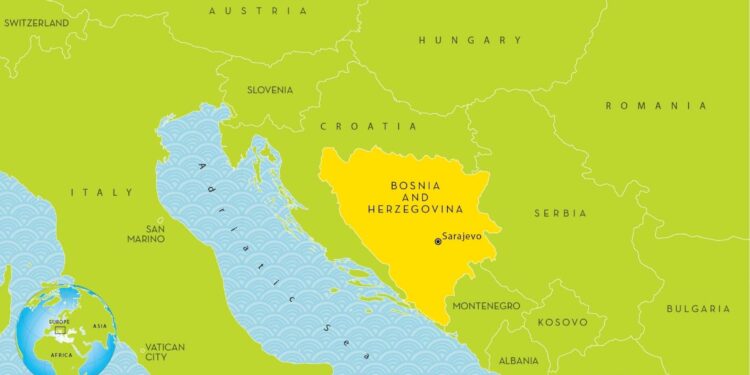Bosnia and Herzegovina stands at a critical political crossroads as Milorad Dodik, one of the country’s most influential and controversial leaders, faces a mounting reckoning. Once seen as a pivotal figure in the fragile post-war power-sharing arrangement, Dodik’s recent moves have intensified ethnic divisions and threatened the delicate stability of the Balkan nation. As international pressure grows and domestic opposition strengthens, the outcome of this reckoning could reshape Bosnia and Herzegovina’s future, testing the resilience of its institutions and the broader regional order. This article examines what is at stake for the country amid these unfolding developments.
Milorad Dodik’s Challenge to Bosnia and Herzegovina’s Political Stability
Milord Dodik’s recent political maneuvers have intensified tensions in a nation already grappling with ethnic divisions and fragile governance structures. His rhetoric and strategic moves challenge the core principles of Bosnia and Herzegovina’s constitutional framework, raising concerns about potential destabilization. At the heart of the crisis is Dodik’s push for greater autonomy for Republika Srpska, which many interpret as a step toward undermining the country’s sovereignty and risking a renewed cycle of ethnic conflict.
Key implications of this escalating political standoff include:
- Risk of institutional paralysis: Governmental institutions may become ineffective amid rising inter-ethnic mistrust.
- Threat to EU integration efforts: Political instability hampers Bosnia’s path toward European Union membership.
- Potential for international intervention: Heightened tensions could prompt renewed involvement from international bodies aiming to preserve peace.
| Aspect | Impact | Outlook |
|---|---|---|
| Political Unity | Fragile | Uncertain |
| International Relations | Strained | Challenging |
| Economic Stability | Vulnerable | At Risk |
The Risks of Ethno-Nationalism on Regional Security and Governance
The resurgence of ethno-nationalist rhetoric in Bosnia and Herzegovina, epitomized by Milorad Dodik’s recent political maneuvers, poses a grave threat to both regional stability and effective governance. By championing divisive identity politics, Dodik not only deepens ethnic cleavages but also undermines the fragile framework established by the Dayton Peace Agreement. Such dynamics risk eroding trust among constituent peoples, empowering separatist agendas, and creating governance paralysis at a critical juncture for Bosnia’s Euro-Atlantic integration efforts.
These risks manifest concretely in several key areas:
- Security Vulnerabilities: Heightened tensions increase the likelihood of localized unrest and provoke external actors’ interference.
- Institutional Breakdown: Prolonged ethnic deadlock stalls crucial reforms in judiciary, police, and public administration.
- Economic Stagnation: Political uncertainty reduces investor confidence and exacerbates unemployment challenges.
| Aspect | Potential Outcome | Regional Impact |
|---|---|---|
| Ethnic Polarization | Escalation of communal tensions | Destabilizes neighboring countries |
| Political Deadlock | Government dysfunction | Delays EU accession talks |
| External Influence | Foreign interference in politics | Complicates regional security cooperation |
Strategic Recommendations for International Engagement and Support
To effectively navigate the escalating political tensions in Bosnia and Herzegovina, international actors must prioritize sustained diplomatic engagement while reinforcing existing frameworks that support peace and stability. This includes a firm stance against any attempts to undermine the Dayton Agreement, ensuring that all parties remain committed to constitutional order and democratic principles. Collaboration between the EU, NATO, and the U.S. is crucial, along with targeted support to civil society organizations working to strengthen democratic resilience at the grassroots level.
Key strategic steps include:
- Enhancing multilateral pressure on political figures promoting secessionist rhetoric.
- Increasing funding for judicial reforms aimed at combating corruption and promoting accountability.
- Facilitating inclusive dialogue platforms that bring together diverse ethnic and political groups.
- Expanding economic assistance focused on reducing socio-political inequalities that fuel divisiveness.
| Strategic Focus | Recommended Action | Expected Outcome |
|---|---|---|
| Diplomatic Pressure | Unified sanctions and condemnations | Deterrence of destabilizing actions |
| Judicial Reform | Support for independent courts | Increased rule of law and trust |
| Societal Engagement | Funding local NGOs and dialogue initiatives | Bridging ethnic divides |
| Economic Assistance | Targeted development programs | Reduced inequality and tension |
Key Takeaways
As Milorad Dodik confronts mounting political challenges, the future of Bosnia and Herzegovina hangs in a precarious balance. The outcome of this reckoning will not only shape the country’s internal cohesion and governance but also influence the broader stability of the Western Balkans. As international actors watch closely, what unfolds in the coming months will be crucial in determining whether Bosnia and Herzegovina can advance toward peace and integration or risk further fragmentation and instability.
















